Are Gerbera Daisies Toxic to Cats If you own a cat, you want your home to be safe for them. You might wonder if gerbera daisies are safe for cats. It’s key to know if gerbera daisies are toxic to cats, especially if your cat likes to chew on plants.
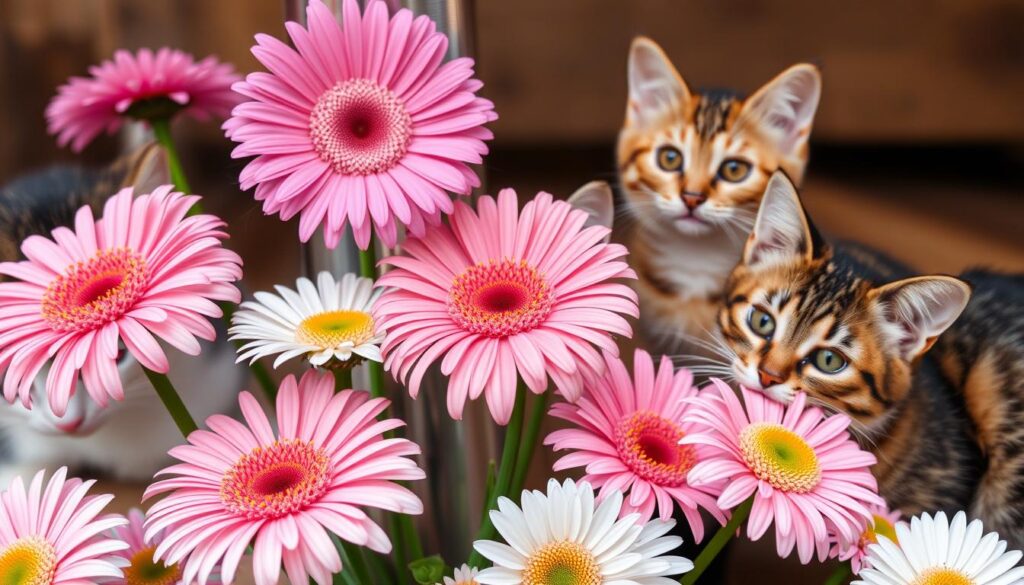
It’s important to understand the risks of gerbera daisies and cats. Knowing if gerbera daisies are toxic to cats can help keep your pet safe. We’ll talk about the dangers of gerbera daisies for cats and how to protect your cat from them.
Key Takeaways
- Gerbera daisies can be toxic to cats if ingested
- Understanding the toxicity of gerbera daisies for cats is crucial to keeping your cat safe
- Gerbera daisies and cats can be a dangerous combination if you’re not aware of the potential risks
- There are steps you can take to prevent your cat from ingesting gerbera daisies
- Knowing the answer to the question are gerbera daisies toxic to cats can help you make informed decisions about the plants in your home
- By taking the necessary precautions, you can enjoy gerbera daisies while keeping your cat safe
Understanding Gerbera Daisies: A Brief Overview
Thinking about getting gerbera daisies for your home? It’s key to know their traits and needs. These flowers are loved for their vibrant hues and lasting beauty. But, it’s important to be mindful of gerbera daisy safety for cats to avoid any risks.
Gerbera daisies come in many colors like pink, yellow, orange, and white. They brighten up any space with their lively colors. To keep your cat safe, make sure to keep these flowers out of their reach.
Physical Characteristics of Gerbera Daisies
Gerbera daisies have big, daisy-like flowers with solid or bi-colored petals. They last a long time, making them perfect for flower arrangements. To care for them, give them lots of water and sunlight.
Popular Varieties and Colors
Some favorite gerbera daisy types are ‘Sunday Funday’ and ‘Sunkist’. These flowers come in various colors, including:
- Pink
- Yellow
- Orange
- White
Common Uses in Home Decoration
Gerbera daisies are great for adding elegance to bouquets and arrangements. They can also serve as a centerpiece or a standalone decoration. It’s crucial to keep them away from cats to ensure their safety.
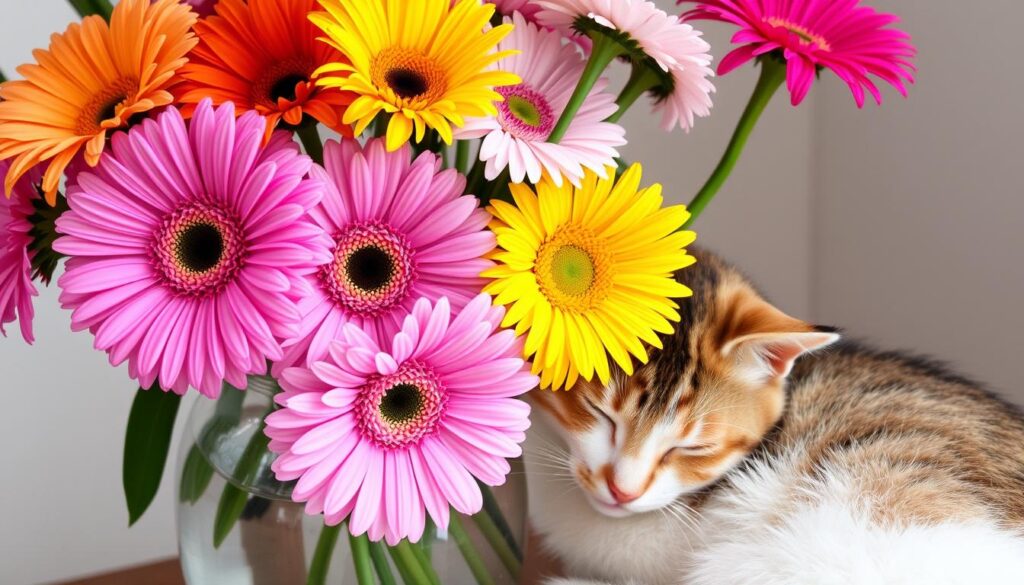
Are Gerbera Daisies Toxic to Cats: The Direct Answer
As a cat owner, you might wonder are gerbera daisies toxic to cats. The truth is, gerbera daisies are not harmful to cats. But, eating a lot of the plant can still cause problems.
If your cat eats gerbera daisies, they might feel sick. They could vomit, have diarrhea, or feel very tired. If you think your cat ate a gerbera daisy, watch them closely for any gerbera daisies poisoning in cats signs.
Here are some important things to remember:
- Keep an eye on your cat’s behavior after they’ve been around gerbera daisies.
- Watch for signs of vomiting, diarrhea, or lethargy.
- If you suspect that your cat has ingested a gerbera daisy, contact your veterinarian for advice.
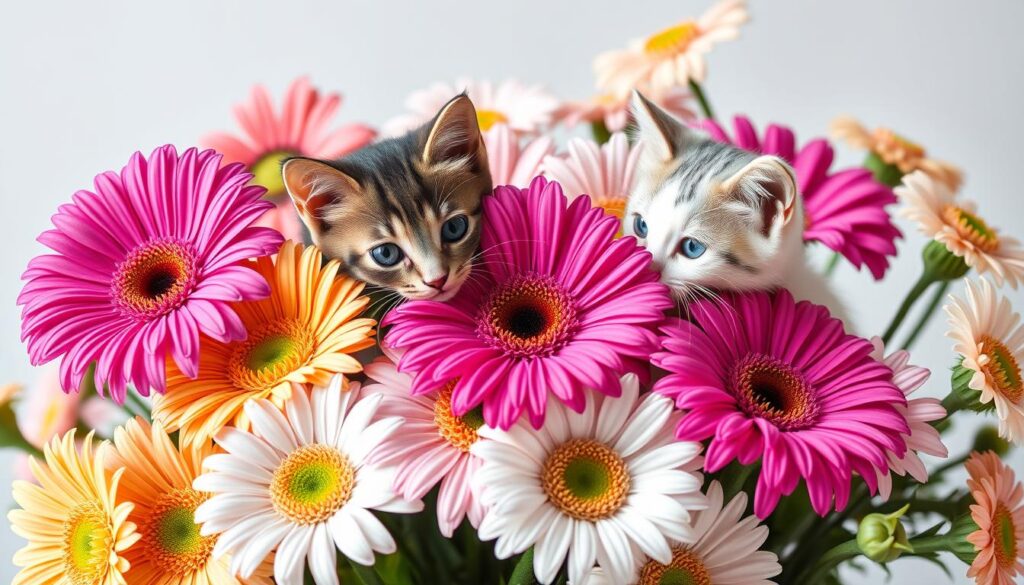
Even though gerbera daisies are not usually toxic to cats, it’s important to be careful. Knowing the risks and taking steps to prevent gerbera daisies poisoning in cats can help keep your cat safe and healthy.
Common Plant Toxicity Levels in Household Flowers
Understanding gerbera daisies and cat health is key. Many household plants, including gerbera daisies, can harm cats. It’s important to know the risks to keep your home safe for your cat.
Cat-friendly flowers like gerbera daisies can still be dangerous if eaten. Some plants can cause mild to severe symptoms in cats. This includes vomiting, diarrhea, and even organ failure. Knowing the risks helps keep your cat safe.
Understanding Plant Toxicity Classifications
Plant toxicity classifications help you know which plants are safe for cats. The American Society for the Prevention of Cruelty to Animals (ASPCA) lists toxic and non-toxic plants. This information helps you choose safe flowers for your home.
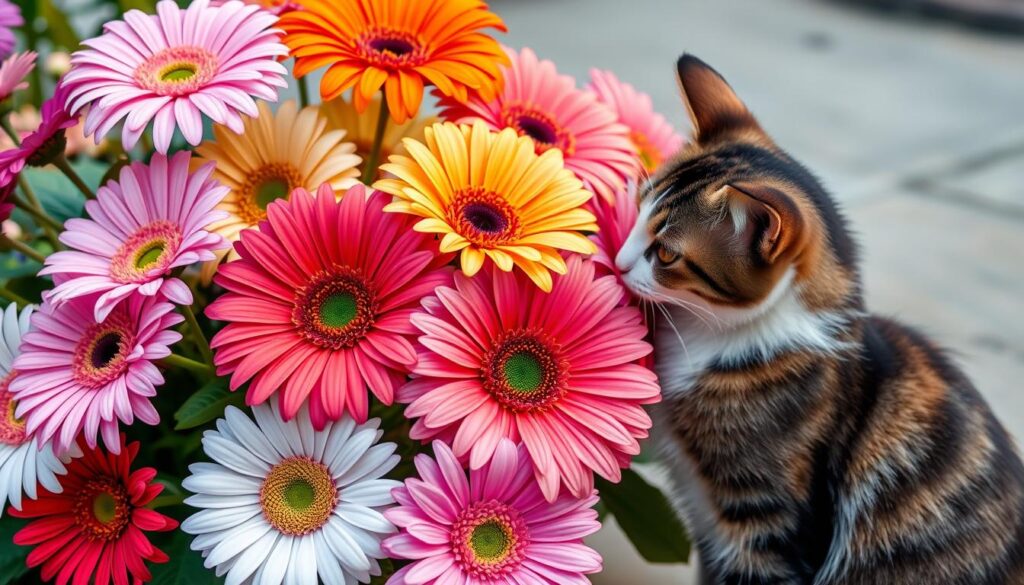
How Plants Affect Feline Health
Plants can harm cats in different ways. They can cause mild upset or serious health issues. If you think your cat ate a toxic plant, get vet help right away.
Your vet can guide you on treatment and prevention. By knowing the risks and taking steps to protect your cat, you can enjoy flowers like gerbera daisies safely.
Signs Your Cat Has Been Exposed to Harmful Plants
If you think your cat ate gerbera daisies, look for signs of gerbera daisies poisoning in cats. Symptoms can be mild or serious. They might include vomiting, diarrhea, and feeling very tired. In some cases, gerbera daisies ingestion in cats can cause serious health problems like breathing issues or organ failure.
Some common signs that your cat has been exposed to harmful plants, including gerbera daisies, are:
- Vomiting or diarrhea
- Lethargy or depression
- Lack of appetite
- Increased heart rate or respiratory rate
If you see any of these signs, get your cat to the vet right away. Your vet can tell you what to do next and help keep your cat safe. Quick action is very important for your cat’s health.
It’s also key to know the risks of gerbera daisies poisoning in cats and prevent it. Watch your cat closely and make sure they’re in a safe place. This way, you can keep your cat safe and healthy.
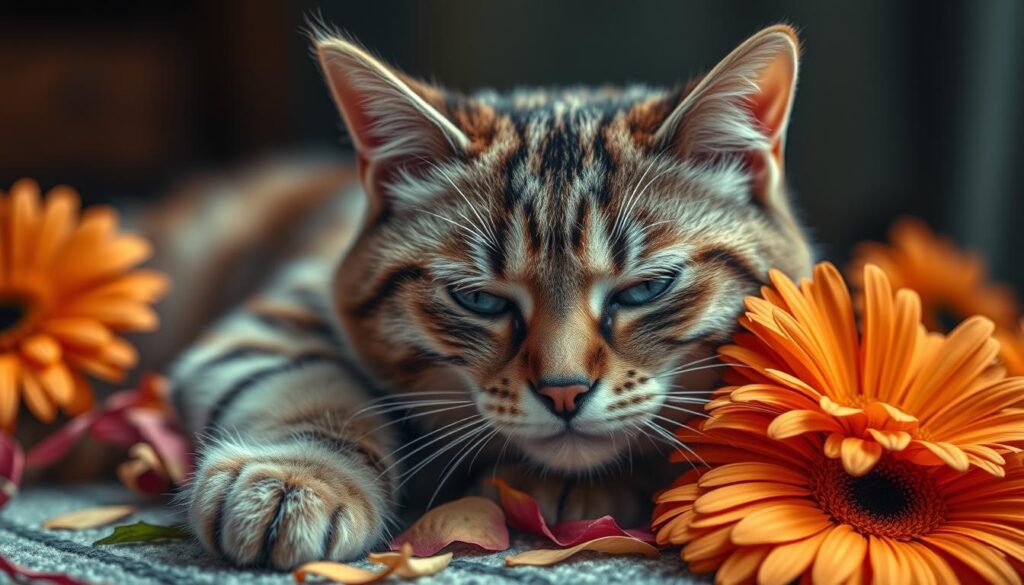
By staying informed and taking action, you can protect your cat from gerbera daisies and other harmful plants.
| Symptom | Description |
|---|---|
| Vomiting | Forceful expulsion of food or liquid from the mouth |
| Diarrhea | Loose or watery stool |
| Lethargy | Lack of energy or enthusiasm |
Keeping Your Cat Safe Around Gerbera Daisies
As a cat owner, it’s crucial to be careful with gerbera-daisies at home. Gerbera daisies care around cats needs careful attention to keep your cat safe. First, think about where you put your gerbera-daisies. Make sure they’re not where your cat can get to them.
Gerbera-daisies are a favorite among cat owners because they’re safe. But, they can still upset your cat’s stomach if eaten. To avoid problems, follow these easy steps:
- Put gerbera-daisies on high shelves or in hanging baskets to keep them away from your cat.
- Use plant covers or toxic plant-free zones to block your cat from the gerbera daisies.
- Teach your cat to stay away from plants by giving them treats when they ignore the gerbera-daisies.
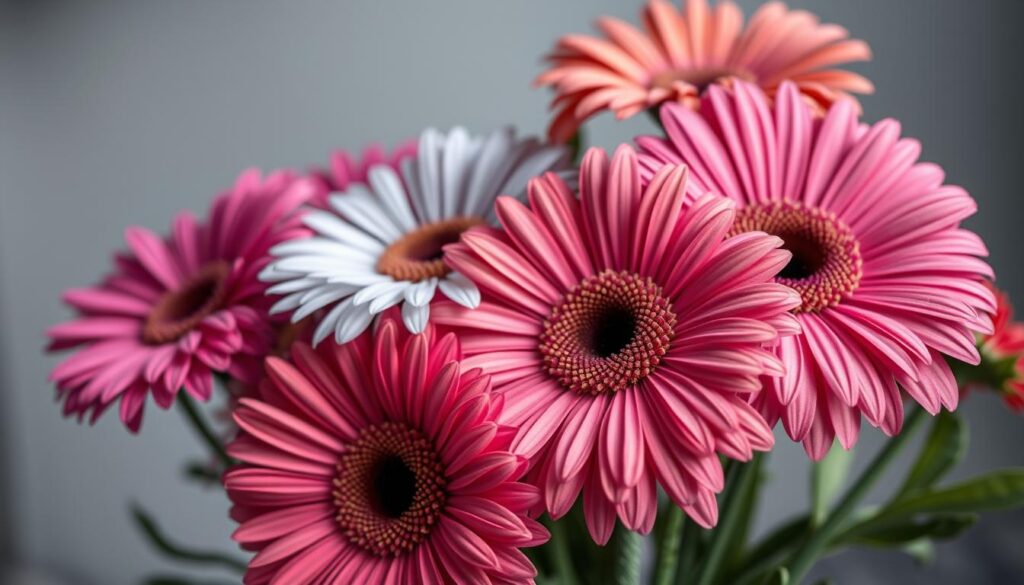
By following these tips, you can enjoy gerbera-daisies while keeping your cat safe. Remember, it’s all about watching your cat and preventing accidents. With a bit of planning and care, you can make a safe space for both your cat and gerbera-daisies.
What to Do If Your Cat Eats Gerbera Daisies
If your cat eats gerbera-daisies, act fast to avoid gerbera-daisies poisoning in cats. Gerbera-daisies are not toxic, but they can upset a cat’s stomach.
Watch your cat closely if they eat gerbera-daisies. Look for signs like vomiting, diarrhea, or feeling very tired. If you see these, get vet help right away.
Here are some emergency steps to take:
- Remove any remaining plant material from your cat’s mouth and surrounding area
- Provide your cat with plenty of fresh water to drink
- Offer a small, bland meal to help soothe their stomach
Always be careful with your cat’s health. If you’re not sure or see any gerbera-daisies poisoning in cats symptoms, call your vet.
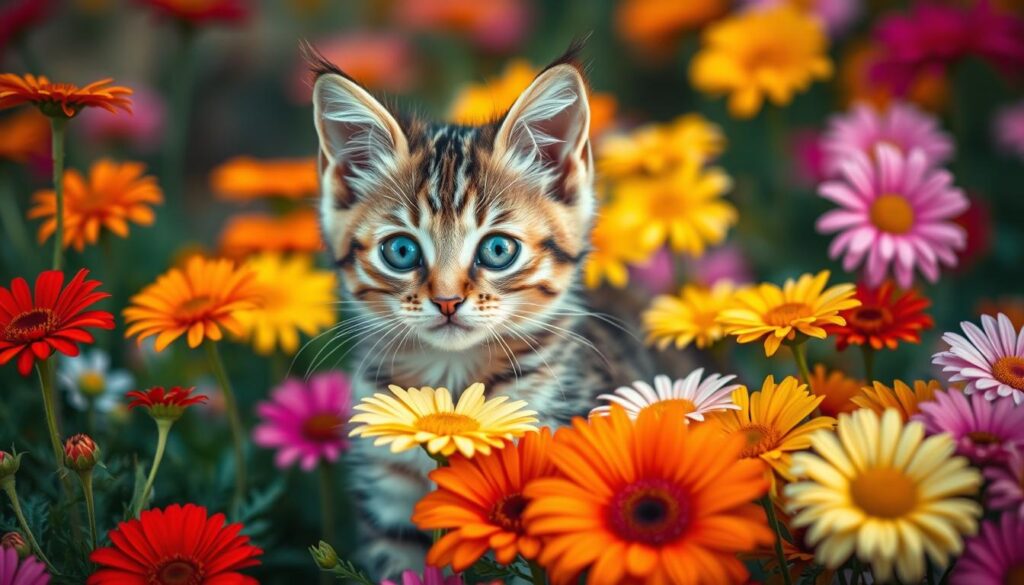
Cat-Safe Alternatives to Gerbera Daisies
Choosing flowers safe for your cat is important. There are many options besides gerbera-daisies. Flowers like orchids, sunflowers, and certain daisies are safe for cats. They are not only pretty but also good for your cat’s health.
Gerbera-daisies can be a problem, but there are safer choices. Here are some cat-friendly flowers:
- Orchids: These flowers are not only beautiful but also non-toxic to cats.
- Sunflowers: Bright and cheerful, sunflowers are a great alternative to gerbera-daisies.
- Daisies: While gerbera-daisies are toxic to cats, other types of daisies are safe and can add a touch of elegance to your home.
Even safe flowers can upset a cat’s stomach if eaten in large amounts. Always watch your cat around new flowers. Choosing cat-friendly flowers lets you enjoy beauty while keeping your cat safe.

Creating a pet-safe space is also important. Keep toxic plants away and give your cat lots of toys and scratching posts. These steps help keep your cat healthy and happy, letting you enjoy flowers without worry.
| Flower | Toxicity to Cats |
|---|---|
| Orchids | Non-toxic |
| Sunflowers | Non-toxic |
| Daisies (non-gerbera) | Non-toxic |
| Gerbera Daisies | Toxic |
Best Practices for Pet-Friendly Gardening
As a cat owner, you want your garden to be safe and healthy for your pet. Gerbera-daisies are cat-friendly, but watch your cat around them. It’s important to be careful.
To make a pet-friendly garden, pick non-toxic plants and flowers. Gerbera-daisies are a good choice. Here are some tips:
- Keep toxic plants out of reach: Place toxic plants where your cat can’t get to them.
- Use pet-friendly fertilizers: Pick fertilizers that are safe if your cat eats a plant.
- Provide a safe outdoor space: Make a secure area for your cat to play and relax without danger.
By following these tips, you can have a beautiful and safe garden for you and your cat. Always put your cat’s safety first when caring for gerbera-daisies.
With a little planning and creativity, you can have a stunning garden that’s safe for your cat. Choose cat-friendly flowers like gerbera-daisies and follow these best practices. This way, you can create a garden that you and your cat will both love.
| Plant | Toxicity Level | Safety Precautions |
|---|---|---|
| Gerbera Daisies | Non-toxic | Keep out of reach of cats to avoid ingestion |
| Lilies | Toxic | Keep in a secure location to prevent ingestion |
| Succulents | Non-toxic | No special precautions needed |
Conclusion: Creating a Safe Floral Environment for Your Feline Friend
Gerbera-daisies are lovely, but they can be harmful to cats. Knowing the risks helps you keep your cat safe. Make sure to keep gerbera daisies and cats apart and teach your cat to stay away from them.
Also, think about using flowers that are safe for cats. This way, you can still enjoy beautiful plants without worrying about your pet’s health.
Your cat’s safety is crucial. By creating a safe space for them, you can enjoy gerbera daisies while keeping your cat happy and healthy. With care and attention, your home can be a place of beauty and love for both you and your cat.
FAQ
Are gerbera daisies toxic to cats?
Yes, gerbera-daisies can harm cats if they eat them. The plant has compounds that can upset a cat’s stomach. This can lead to vomiting and diarrhea.
What are the symptoms of gerbera daisy poisoning in cats?
Cats that eat gerbera-daisies might show signs like vomiting and diarrhea. They might also seem tired and not want to eat. If you think your cat has eaten this plant, get vet help right away.
How can I keep my cat safe around gerbera daisies?
To keep your cat safe, don’t have gerbera-daisies at home or in your garden. If you do have them, keep them away from your cat. Teach your cat to stay away from the plants. You can also use covers or create safe areas for your cat.
What should I do if my cat eats a gerbera daisy?
If you see your cat eating a gerbera daisy, call your vet or the ASPCA Animal Poison Control Center. They will tell you what to do next. This might include making your cat vomit or giving them care to help them feel better.
Are there any cat-friendly flowers I can use instead of gerbera daisies?
Yes, there are many safe flowers for cats. You can choose sunflowers, marigolds, or zinnias. These flowers are safe for cats and can brighten up your home or garden.


1 thought on “Are Gerbera Daisies Toxic to Cats? The Answer Revealed”